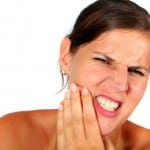 Many people are aware that we need to take steps to look after our teeth and gums, but have you ever spared a thought for your jaw joint? Your jaw is heavily involved with lots of commonly performed actions and movements and it can be susceptible to wear and tear. We see many patients who have signs of TMJ(temporomandibular joint) disorder and if you regularly suffer from migraines, jaw pain or stiffness around the jaw, this could be causing problems for you too. Here is a brief guide to help you prevent jaw pain and cope with symptoms of TMJ disorder:
Many people are aware that we need to take steps to look after our teeth and gums, but have you ever spared a thought for your jaw joint? Your jaw is heavily involved with lots of commonly performed actions and movements and it can be susceptible to wear and tear. We see many patients who have signs of TMJ(temporomandibular joint) disorder and if you regularly suffer from migraines, jaw pain or stiffness around the jaw, this could be causing problems for you too. Here is a brief guide to help you prevent jaw pain and cope with symptoms of TMJ disorder:
What is TMJ disorder?
This disorder is a fairly common condition characterised by symptoms that affect the TMJ. These symptoms include jaw, neck, shoulder and ear pain, headaches and migraines, a restricted range of movement in the jaw, stiffness and soreness in the joint and clicking and popping noises when you move your jaw. Most cases don’t require formal treatment, but if you suffer from severe or persistent symptoms, treatment may be recommended.
TMJ disorder can be caused by underlying health issues affecting the connective tissue, such as arthritis, but many cases are linked to tooth grinding. Grinding the teeth not only damages the them, it also increases pressure on the muscles around the joint and leads to wear and tear in the connective tissue. If you grind your teeth, it’s a good idea to see your dentist, as they can provide treatment to help prevent clenching and subsequently reduce the risk of developing symptoms. We provide custom-made bite guards to prevent contact between the top and bottom teeth when you’re sleeping and this helps to preserve the teeth and components of the joints.
When should I see my dentist?
If you suffer from jaw pain that comes and goes regularly or gets worse, see your dentist. They will be able to examine the joint and carry out X-rays to identify any problems and find appropriate treatments and remedies.










